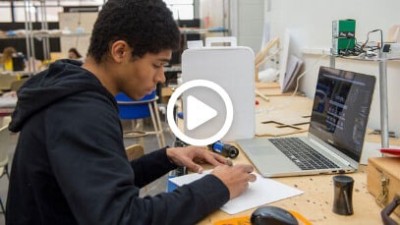Custom co-op forms furniture company
Seth Eshelman ’06 credits RIT for helping him start his successful furniture company Staach.
When Seth Eshelman ’06 (industrial design/graphic design) couldn’t find a co-op during the winter quarter of his senior year, he decided to create his own.
“I used the fourth floor studios at RIT as my first workshop for my company,” Eshelman said about his furniture design business. “I built some of the first prototypes and the first production run up in the fourth floor after hours on the weekends and after school.”
Today, that company, based in Rochester and called Staach, focuses on functional sustainable design. Its products can be found around the world, including in Shake Shack locations and at the Google offices in Mountain View, Calif.
Eshelman started the business producing laser-cut plywood furniture then switched to solid woods during his first two years.
After many 18-hour days, he created the Cain Collection, which includes stools, benches, chairs and tables.
Once he had the collection, Eshelman had to sell it. He began making cold calls to architects and designers, people he said he knew how to talk to, and found small firms who were interested in working with him.
“One small commercial project turned into three, which turned into six, which turned into 12 and it kept going from there,” he said.
A big break came about five years ago when a designer contacted him about the Cain Collection and said they were designing restaurants in New York City and asked him to be part of the bid.
He put together a quote, got the order and delivered the furniture to what turned out to be Shake Shack, which now has locations all over the world. Staach furniture is in all but a couple.
The Cain Collection also can be found in the Dwell Store and pieces have been featured in Dwell magazine as a top product.
Although the Cain Collection continues to be the most popular, the company has five other furniture lines. And the company has expanded beyond furniture. For example, it is providing the design concept for a mixed-use residential and commercial building at 88 Elm St. in Rochester that will rise 13 stories.
Eshelman also established a subsidiary underneath Staach called Standard Industries, which will become the contract manufacturing entity and expand into new markets. His goal is to become a major player in the manufacturing scene.
All of this and he hasn’t forgotten his RIT roots. He is teaching an industrial design class of juniors this spring, employs RIT alumni and student interns, and regularly welcomes class tours at Staach.
“RIT is what provided us with our start. That’s how everything happened,” he said. “If it wasn’t for RIT, Staach wouldn’t really exist.”








